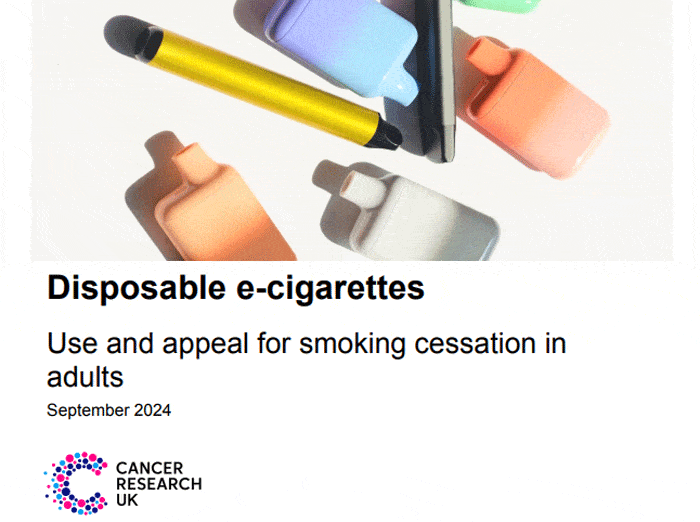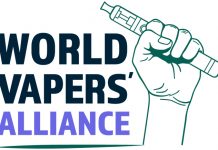Cancer Research UK has published a report on their concerns about the upcoming UK disposable vape ban.

You can read the full report here – or I will summarise the main points below.
The aim of the report is to investigate the use and appeal of disposable vapes in a diverse sample of UK adults with varying histories of tobacco or vape use.
Method
40 study participants were interviewed to discover their views and experiences of disposable vapes.
The participants were roughly grouped as follows:
- People who use/d disposables with the intention to quit or reduce smoking, including people who smoke and use disposable e-cigarettes (dual users) (number=11)
- People who use/d disposable e-cigarettes and have quit smoking (n=9)
- People who have never smoked and use disposable e-cigarettes (n=11)
- People who smoke and do not use/have never used disposable e-cigarettes (n=9).
Positive Responses
- Many participants agreed that disposable vapes played a vital role in helping them to quit smoking.
- Other forms of nicotine replacement therapy were generally felt to be less effective.
- The main reason for the choice of disposable vapes over other vaping products were their convenience, cost and ease of use.
- The simplicity and ease of access to the products were seen to play an important role.
- Vaping with a disposable vape was believed to be closer to the action and experience of smoking and therefore allowing for a smoother transition away from tobacco products.
- Cost was a big factor as the disposable vapes were cheaper than purchasing tobacco and required less of a financial commitment than purchasing re-usable vape kits.
- Also vaping was viewed as being more socially acceptable than smoking.
Areas Of Concern
Several areas of concern were identified…
- Use of vapes by non tobacco users
- Mixed views about health impacts
- Environmental concerns about the waste generated
Impact Of Disposable Vape Regulation
The interviews were conducted in December 2023 – just before the announcement in January 2024 of a possible disposable vape ban.
- Many participants favoured further regulation in regards to prevent youth vaping – including harsher penalties for under age sales.
- But the ban also made some people feel like disposable vapes were being targeted as they were more harmful than cigarettes.
- Some participants also felt the ban would lead to an increase in illicit and counterfeit vape sales.
“Participants suggested that a ban or restrictions on disposable e cigarettes would lead either to
a) them switching to refillable e-cigarettes or
b) going back to cigarettes and/ or smoking more.
The latter view was particularly prevalent in the group of people who dual use – using disposable e-cigarettes whilst still smoking. “
Conclusion
The report is quite balanced about the attraction of disposable vapes to underage users and environmental concerns against the ease of use and accessibility of them for people wanting an easy transition from smoking.
The point about over regulation impacting those who require disposable vapes the most is further emphasised…
“With tighter regulations, including the potential banning of disposable e-cigarettes, people may be more likely to view both disposable and other types of e-cigarettes as more harmful than they did previously – and for some, tighter regulations make e-cigarettes seem as harmful as, or more harmful than, tobacco.
In the event of further restrictions on disposable e-cigarettes it is unclear whether people currently using disposable e-cigarettes are more likely than they would have been to quit both tobacco and e-cigarettes entirely, switch to using refillable e-cigarettes or revert to smoking tobacco.
The people at highest risk of reverting to sole state tobacco use appear to be those who currently both smoke and use e-cigarettes. “
Policy Recommendations
The document ends with some policy recommendations to help ensure that all adults have the access they need to these devices whilst also trying to ensure there are minimal consequences in other areas…
“These recommendations were developed by Cancer Research UK’s policy experts based on the research findings from this study and other evidence and wider considerations.
Nicotine is an addictive product.
Disposable e-cigarettes are only one delivery system for nicotine, but many others are readily available, and – unlike e-cigarettes – often contain tobacco, which causes cancer.
It is hard to predict exactly how people who use disposable e cigarettes would react to a new restrictions, up to and including a ban, including whether they will quit nicotine fully, move on to another product containing nicotine, or try to use illicit products.
It’s important that any new restrictions on disposable vapes strike a balance between preventing youth uptake and usage and encouraging smoking cessation, to minimise against any unintended consequences, such as leading people to smoking instead.”
- Ensure people who smoke still have access to a wide range of cessation
options, including refillable / reusable e-cigarettes. - Reduce vaping in young people and those who have never smoked.
- Ensure regulation is fit for purpose and effectively enforced.
Access
Cancer Research UK recommend that UK governments should make sure that all stop smoking services are correctly funded and easily accessible to all. Again refillable / reusable vapes should also be widely available even if disposable vapes are banned.
Also education campaigns are required to make sure that the public are aware of the relative harms between combustible tobacco smoking and vaping. As banning disposable vapes could portray a negative message about vaping.
Reducing Underage Vaping & Uptake By Never Smokers
The recommendations here focus on making vaping unattractive to young people and also those who have never smoked.
Suggestions include regulating packaging & displays, education and making sure people do not turn to illicit supplies or return to smoking.
Fit For Purpose Regulation
Recommendations include making sure enforcement agencies such as Trading Standards have the resources they need to regulate the supply of vaping products. This is especially important if disposable vapes are banned – as illicit supply chains could become more popular.
Also methods of e-cigarette disposal should be readily available to the public.
Responses
1/ Newly published study by @ScotCen & commissioned by the Cancer Research UK Social & Behavioural Research Team on:
‘Disposable e-cigarettes: use and appeal for smoking cessation in adults’. Read below to find out more⬇️📑 https://t.co/1xZ15XLFJe pic.twitter.com/flwWwYhJBv
— Cancer Research UK Policy (@CRUK_Policy) September 11, 2024
From @CRUK_Policy for @wesstreeting @DHSCgovuk @OHID
Reminder: restrictions will stop adults from switching; half will go on to die early. While youth vaping is undesirable, it is not deadly like cigarettes.
Improve compliance with age laws/keep the illegal market in check. pic.twitter.com/G9vL5ulmc7
— Richard Pruen (@PruenRichard) October 7, 2024
Lengthy but timely report via @CR_UK regarding banning /not disposables.
Sensible recommendations (see P31 ->)https://t.co/r5Ey22C4qT
fao @wesstreeting @andrewgwynnemp— Alan Beard (@Alan_Beard1) September 9, 2024





